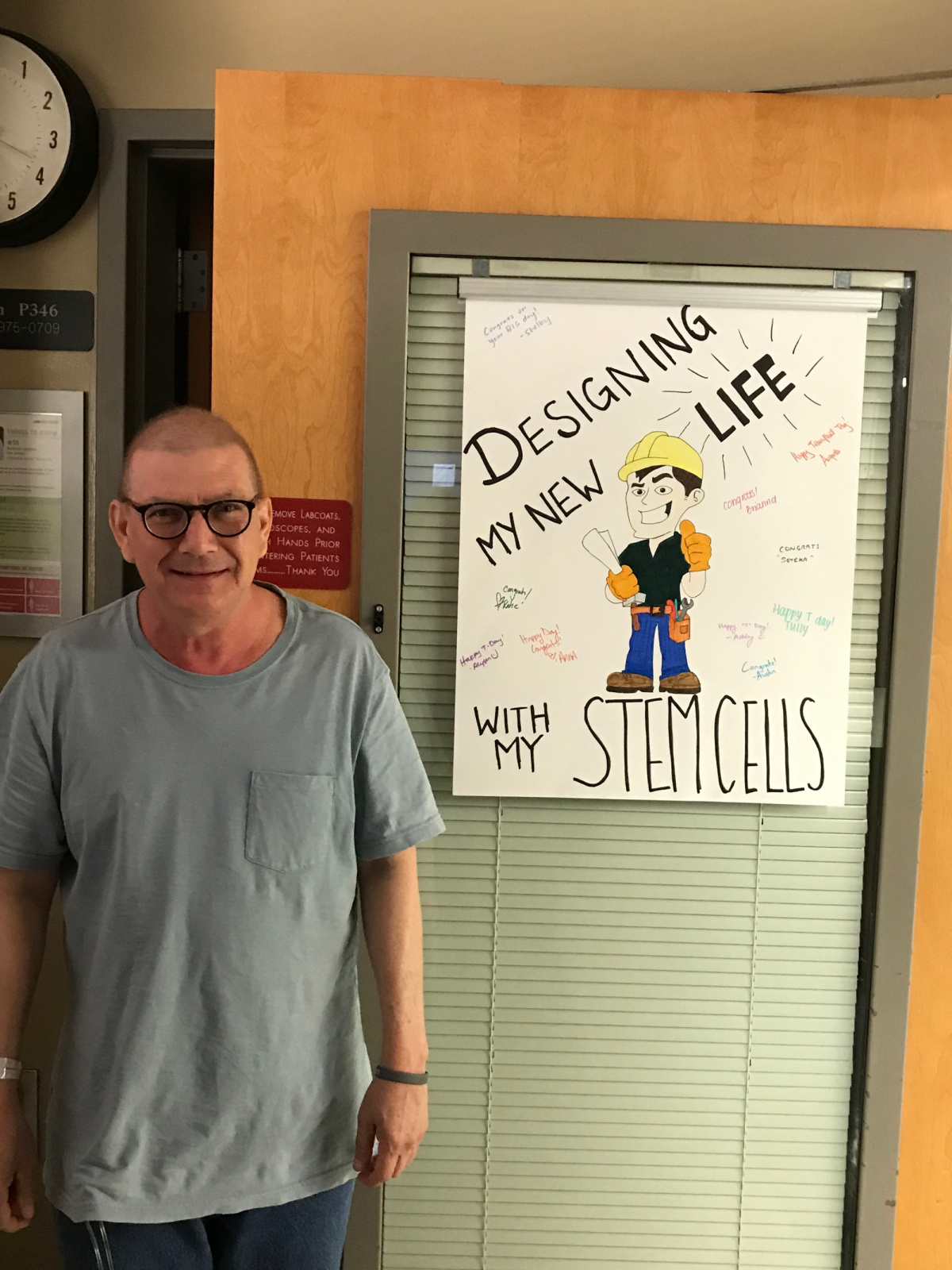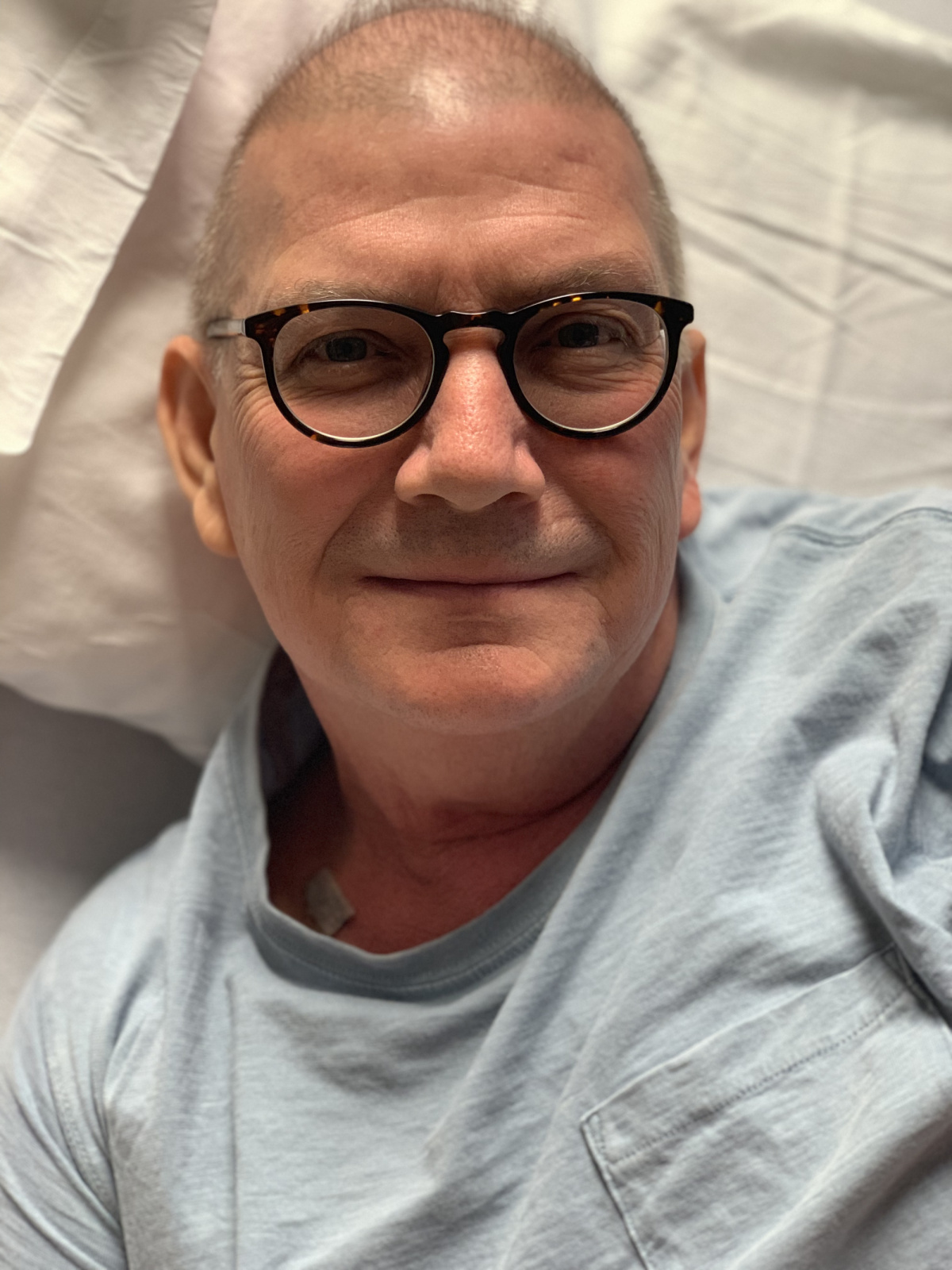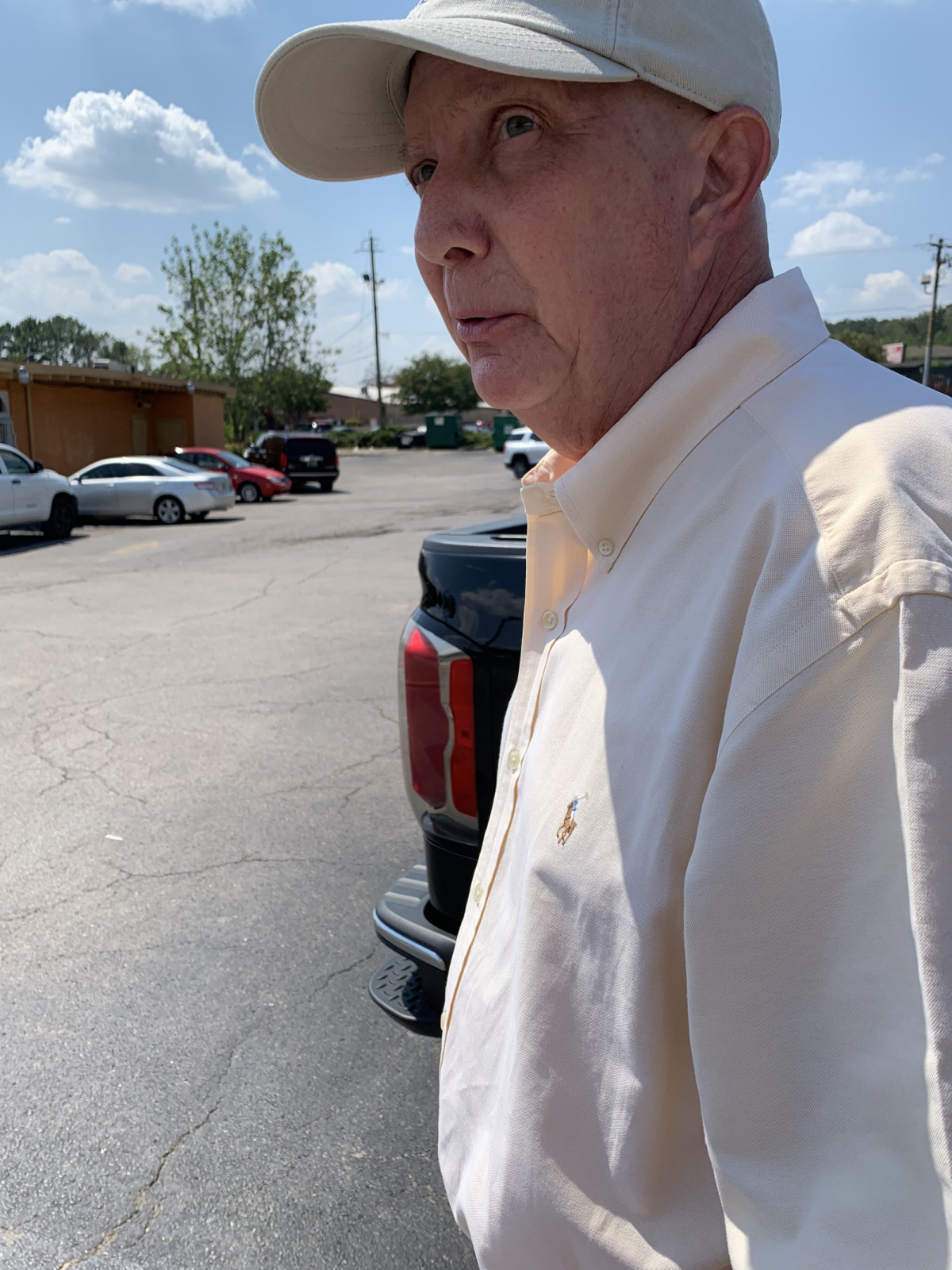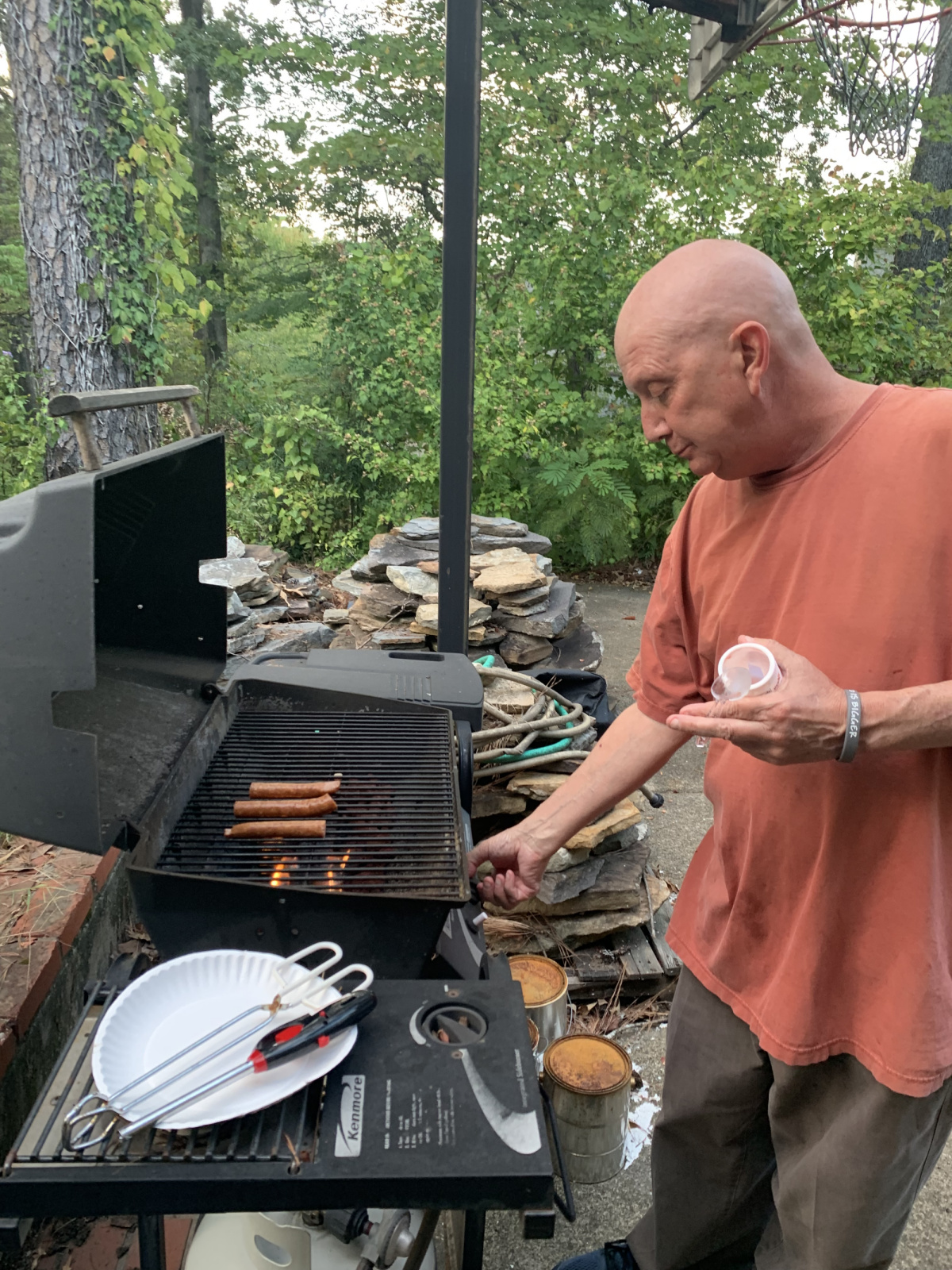Journal entry by Hannah Burgess —
The week after Dad got diagnosed with leukemia, my sister and I sat at the kitchen table while Mom slept with Dad at the hospital. Statistics that we had researched in the six days since diagnosis served as the elephant in the room. I made stiff margaritas with cheap tequila in crystal glasses, and we sorted out pictures of Dad dating back to his childhood. In that moment, I saw my dad as an indestructible fixture - a permanent figure in a photograph that could not cease to exist. As we sorted through pictures of Mom and Dad at their beach wedding, Dad holding a Miller Lite in one hand and Mom’s hand in the other, I wondered if Dad would be around for my own wedding one day. Just Wednesday, I sat on the side of his bed in the emergency room as doctors came in and out of his room, speaking nonchalantly of his new diagnosis. I could never quite catch my breath.
After the initial diagnosis, every moment seemed to slow down. Our weeks were filled with hospital stays and bone marrow biopsies. Dad went through chemotherapy with minimal side effects (one to two days of nausea throughout the three rounds). We found out we had a stem cell donor on June 11th. We found out we were in remission on June 21st (which means we were ready for the transplant). We planned to be re-admitted to the hospital in early July for one last round of chemotherapy and to receive the transplant, but unfortunately, we lost the initial donor. It was a punch in the gut, but luckily, we found another donor (a 28-year-old male from Europe) shortly after. We went into the hospital toward the end of July and received the stem cell transplant on July 27th.
Dad was in good spirits for the majority of his stay on the bone marrow transplant unit. He kept his blueprints from work on his bedside table and slept in oversized jeans. I bothered him with frantic phone calls about my washing machine breaking followed by hourly calls assessing prices of local repairmen. When the day finally came, we videoed the transplant - you can see the donor’s cells going into Dad’s body. Dad wanted us to put music behind the video. He suggested the Auburn fight song or the Wizard of Oz “March of the Winkies.” We never came to an agreement. Our hospital stay was shorter than expected (around 20 days), and Dad was sent home on anti-rejection medications, steroids, vitamins, and antibiotics. Like he did between every hospital stay, he returned to work (and his normalcy) the day after discharge. Bailey cooked a strict diet for Dad every night, and Mom changed the sheets on the bed every other day to decrease the risk for infection.
Mom accompanied Dad to his two appointments each week where his labs were checked and his medications were adjusted. The first reaction to the transplant that we noticed was the overwhelming fatigue and loss of appetite (also, nothing tasted like he remembered). After a couple of weeks, Dad developed a rash over most of his body. He felt completely weak and exhausted with intermittent days of feeling more energetic than usual. Toward the end of August, Dad celebrated his 57th birthday. To be honest, I wondered if it would be his last. I saw Dad disappearing. He had dwindled down to 140 pounds, could not eat, and had persistent gastrointestinal upset. Although we could see his deteriorating condition, Dad insisted on normalcy.
I suppose there was finally a turning point, which I had conditioned myself not to anticipate. Dad asked me to run to Publix to buy him an 8-pack of coke (the bottles, NOT the cans), Hawaiian punch (fruit punch flavor, NOT the gallon size), and ice cream sandwiches (miniatures, NOT the full size, with vanilla breading, NOT the chocolate). Dad’s barking orders were the sweetest thing I had heard in months.
“Hannah, if you get the gallon jug, I won’t drink it. If you get chocolate ice cream sandwiches, I won’t eat ‘em. And I won’t drink the cans. They need to be the bottles. Seriously, don't even think about coming into the house with a gallon-size Hawaiian punch.”
After that day, Dad started to feel more and more like himself. It was a drastic improvement from his days of “not remembering what it is like to feel good.” He finally began to look more like Dad. There was finally a bit of calmness.
On Friday, we will go back to the doctor to check to see if he accepted the transplant. To be honest, I have no clue what it entails and what it truly tests. From what I have heard, this is done 100-days after the transplant takes place.
A few extra notes that just don’t seem to fit in anywhere:
1. These have been the most raw moments I have experienced. There have been so many moments that have taken my breath away - some good and some bad. I think there are some assumptions that these devastating moments bring us together. For the sake of being honest, these moments have exposed our anger, impatience, and insecurities. Admittedly, I have screamed in my parent’s driveway as I waited for my dad to come home from work, because I wanted him to rest and heal, not completely understanding his desire for normalcy and purpose. I watched him fumble around with tree loppers in the Alabama heat. He held his balance on his tiptoes with his hands gripped around the tool hanging from the tree as branches fell around him. As I scolded him, he calmly informed me that he didn’t want to park his truck under a branch that could leave a scratch. There were moments where Mom and I just screamed on the telephone about how sleepy and tired we were until we finally hung up in frustration. There were equally beautiful moments where Dad would make a joke at someone else’s expense and we were reminded we still had Dad.
2. As often as people ask about Dad, they also ask about Mom. Talking about our mom in this situation is emotionally overwhelming. She has lead our family in this situation with grace. She has continued to work, while taking Dad to appointments and keeping things in order at home. All the while, she selflessly cares for her children. She answers every question that I should ask Google - “how long do you boil an egg,” “what is pain radiating down my spine,” or “can I cook steak on the stovetop?” She guides us effortlessly. She is exhausted, but she is dedicated. She is the most beautiful example of a mother and a wife. All she asks in return is that the kitchen is re-painted.
3. Loving Dad has made me a more compassionate nurse and person. I picture every patient as my Dad (or my mom, for that matter) and find myself with a lump in my throat as I place myself in their shoes. I am reminded every day that these are likely the worst (and scariest) moments of a patient’s life thus far. There is no certainty as a patient and his or her loved ones try to grasp a new set of circumstances. I cannot express how lucky I am to have gained this perspective.
4. I will try to keep this brief, too. We are extremely fortunate. We are fortunate that Dad was in good health and relatively young prior to his diagnosis. We are fortunate that we had access to health care close in proximity and specializing in Dad’s cancer. We are fortunate that we found a donor (this has a great deal to do with Dad’s sex and race) and were insured and able to afford treatment and medication. I am grateful Dad had a clean home to return to after the transplant. We are fortunate to have a support system. Lastly, we are fortunate to be educated. Dad’s experience has presented a glaring disparity in our health system. I went with Dad to an appointment a month or so ago. This was the week that Dad had the rash covering over 69% of his body. His magnesium level was also wonky. The doctors and nurse practitioner changed his medications - increasing his steroid to treat the rash, decreasing his Prograf (organ rejection drug) because increasing the other medications increased the absorption of this medication, blah, blah, blah. Also, now the Prograf had to change from a pill to an oral suspension because of the dosage. Another kicker - this oral suspension is not carried at a traditional pharmacy. I feel pretty confident in medical conversation, but this appointment required diligent note taking and Google translation. As we left the appointment, I asked Dad if he comprehended any of the information discussed. He said it was all Spanish to him. You catch my drift? The uneducated, the sick, those without caregivers and advocates - these folks are at an incredible disadvantage when it comes to patient education and compliance.
I know I said these posts would not be too long, but no one ever accused me of being brief. Love you all.
After the initial diagnosis, every moment seemed to slow down. Our weeks were filled with hospital stays and bone marrow biopsies. Dad went through chemotherapy with minimal side effects (one to two days of nausea throughout the three rounds). We found out we had a stem cell donor on June 11th. We found out we were in remission on June 21st (which means we were ready for the transplant). We planned to be re-admitted to the hospital in early July for one last round of chemotherapy and to receive the transplant, but unfortunately, we lost the initial donor. It was a punch in the gut, but luckily, we found another donor (a 28-year-old male from Europe) shortly after. We went into the hospital toward the end of July and received the stem cell transplant on July 27th.
Dad was in good spirits for the majority of his stay on the bone marrow transplant unit. He kept his blueprints from work on his bedside table and slept in oversized jeans. I bothered him with frantic phone calls about my washing machine breaking followed by hourly calls assessing prices of local repairmen. When the day finally came, we videoed the transplant - you can see the donor’s cells going into Dad’s body. Dad wanted us to put music behind the video. He suggested the Auburn fight song or the Wizard of Oz “March of the Winkies.” We never came to an agreement. Our hospital stay was shorter than expected (around 20 days), and Dad was sent home on anti-rejection medications, steroids, vitamins, and antibiotics. Like he did between every hospital stay, he returned to work (and his normalcy) the day after discharge. Bailey cooked a strict diet for Dad every night, and Mom changed the sheets on the bed every other day to decrease the risk for infection.
Mom accompanied Dad to his two appointments each week where his labs were checked and his medications were adjusted. The first reaction to the transplant that we noticed was the overwhelming fatigue and loss of appetite (also, nothing tasted like he remembered). After a couple of weeks, Dad developed a rash over most of his body. He felt completely weak and exhausted with intermittent days of feeling more energetic than usual. Toward the end of August, Dad celebrated his 57th birthday. To be honest, I wondered if it would be his last. I saw Dad disappearing. He had dwindled down to 140 pounds, could not eat, and had persistent gastrointestinal upset. Although we could see his deteriorating condition, Dad insisted on normalcy.
I suppose there was finally a turning point, which I had conditioned myself not to anticipate. Dad asked me to run to Publix to buy him an 8-pack of coke (the bottles, NOT the cans), Hawaiian punch (fruit punch flavor, NOT the gallon size), and ice cream sandwiches (miniatures, NOT the full size, with vanilla breading, NOT the chocolate). Dad’s barking orders were the sweetest thing I had heard in months.
“Hannah, if you get the gallon jug, I won’t drink it. If you get chocolate ice cream sandwiches, I won’t eat ‘em. And I won’t drink the cans. They need to be the bottles. Seriously, don't even think about coming into the house with a gallon-size Hawaiian punch.”
After that day, Dad started to feel more and more like himself. It was a drastic improvement from his days of “not remembering what it is like to feel good.” He finally began to look more like Dad. There was finally a bit of calmness.
On Friday, we will go back to the doctor to check to see if he accepted the transplant. To be honest, I have no clue what it entails and what it truly tests. From what I have heard, this is done 100-days after the transplant takes place.
A few extra notes that just don’t seem to fit in anywhere:
1. These have been the most raw moments I have experienced. There have been so many moments that have taken my breath away - some good and some bad. I think there are some assumptions that these devastating moments bring us together. For the sake of being honest, these moments have exposed our anger, impatience, and insecurities. Admittedly, I have screamed in my parent’s driveway as I waited for my dad to come home from work, because I wanted him to rest and heal, not completely understanding his desire for normalcy and purpose. I watched him fumble around with tree loppers in the Alabama heat. He held his balance on his tiptoes with his hands gripped around the tool hanging from the tree as branches fell around him. As I scolded him, he calmly informed me that he didn’t want to park his truck under a branch that could leave a scratch. There were moments where Mom and I just screamed on the telephone about how sleepy and tired we were until we finally hung up in frustration. There were equally beautiful moments where Dad would make a joke at someone else’s expense and we were reminded we still had Dad.
2. As often as people ask about Dad, they also ask about Mom. Talking about our mom in this situation is emotionally overwhelming. She has lead our family in this situation with grace. She has continued to work, while taking Dad to appointments and keeping things in order at home. All the while, she selflessly cares for her children. She answers every question that I should ask Google - “how long do you boil an egg,” “what is pain radiating down my spine,” or “can I cook steak on the stovetop?” She guides us effortlessly. She is exhausted, but she is dedicated. She is the most beautiful example of a mother and a wife. All she asks in return is that the kitchen is re-painted.
3. Loving Dad has made me a more compassionate nurse and person. I picture every patient as my Dad (or my mom, for that matter) and find myself with a lump in my throat as I place myself in their shoes. I am reminded every day that these are likely the worst (and scariest) moments of a patient’s life thus far. There is no certainty as a patient and his or her loved ones try to grasp a new set of circumstances. I cannot express how lucky I am to have gained this perspective.
4. I will try to keep this brief, too. We are extremely fortunate. We are fortunate that Dad was in good health and relatively young prior to his diagnosis. We are fortunate that we had access to health care close in proximity and specializing in Dad’s cancer. We are fortunate that we found a donor (this has a great deal to do with Dad’s sex and race) and were insured and able to afford treatment and medication. I am grateful Dad had a clean home to return to after the transplant. We are fortunate to have a support system. Lastly, we are fortunate to be educated. Dad’s experience has presented a glaring disparity in our health system. I went with Dad to an appointment a month or so ago. This was the week that Dad had the rash covering over 69% of his body. His magnesium level was also wonky. The doctors and nurse practitioner changed his medications - increasing his steroid to treat the rash, decreasing his Prograf (organ rejection drug) because increasing the other medications increased the absorption of this medication, blah, blah, blah. Also, now the Prograf had to change from a pill to an oral suspension because of the dosage. Another kicker - this oral suspension is not carried at a traditional pharmacy. I feel pretty confident in medical conversation, but this appointment required diligent note taking and Google translation. As we left the appointment, I asked Dad if he comprehended any of the information discussed. He said it was all Spanish to him. You catch my drift? The uneducated, the sick, those without caregivers and advocates - these folks are at an incredible disadvantage when it comes to patient education and compliance.
I know I said these posts would not be too long, but no one ever accused me of being brief. Love you all.






